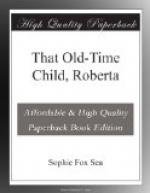When Mam’ Sarah heard the firing she caught hold of Roberta’s hand and started to run, calling on the others to follow. She heard voices shouting to her, in reality the voices of the negroes who had gone down to the tobacco fields, calling to her to turn back. But, in her excitement she thought they were war cries, and ran as fast as she could away from them.
“Let’s go to the play-house under the hill, Mam’ Sarah,” said quick-witted Roberta.
That play-house was a rocky recess, once the bed of some subterranean stream, and protected from view by a sycamore’s gnarled, knotted branches extending down, and hung with matted wild grape tendrils. Mam’ Sarah had often gone down there and spread her linen on the grass to bleach, and she generally took the children along for company. That’s how they happened to find out the rocky recess or cave, for it ran under the hill a considerable distance. They hadn’t been in there long before a shadow darkened the entrance to the recess. A figure crept toward them with the muzzle of a gun pointing straight at them.
“O, don’t shoot!” they cried in terror.
“I won’t,” responded a boyish voice, and when their tears subsided they saw it was a mere lad, wounded and bleeding.
“Are you much hurt?” asked Roberta.
“O, no; just a scratch.”
His chin fell on his chest. A dry sob burst from him.
“I wish now I had been killed with the rest of ’em.”
“Have you got a mother?” Roberta asked.
“Yes, I’ve got a mother; but what will she say when I tell her I left Bert lying yonder in that death-trap? That’s what’s the matter. I wanted to find Bert and take him away with me. I hunted for him all along among those trees, and I got cut off from our boys. I think I must have lost my head, for I forgot which way they went.”
“Who is Bert?” asked Roberta.
“Bert was my brother, and the best boy that ever lived. Curse them!” he cried, shaking his clenched fist; “curse the Yankees. What right have they on Kentucky soil, anyhow?”
“O, don’t curse them,” said the child; “my papa is a Yankee.”
“Is he?” He stopped short and looked at her with a kind of pity. “I am sorry for you, that’s all; sorry from my heart. I’d rather be a negro trader.”
“I’m sorry too,” said Roberta. There was a droop about the corners of her mouth. “But don’t you worry about your brother. Mam’ Sarah and me will find him and do all we can for him.”
“Will you?” said the hoy eagerly; “will you, really? O! that will be too kind for any thing. I can never forget it, never.”
“But how am I to know him? Is he like you?”
“Yes, he is like me; we were twins; but ten million times better looking. He looked like an angel, as he is, as he is.”
Great throes convulsed his chest in his efforts to control himself.
“I don’t want to be a baby, but I was never away from Bert a day in my life. Say, I can tell you how to know him. He has a picture of mother and a Testament in his pocket, with his name written on the fly-leaf, ’Albert Kurl.’”




